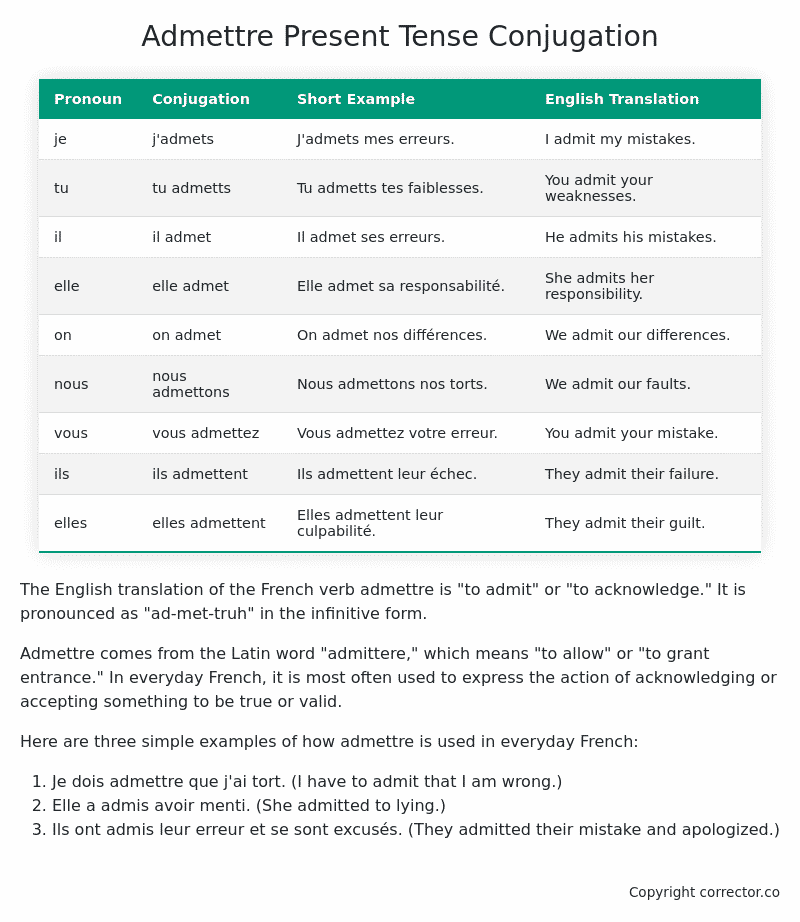Le Present (Present Tense) Conjugation of the French Verb admettre
Introduction to the verb admettre
The English translation of the French verb admettre is “to admit” or “to acknowledge.” It is pronounced as “ad-met-truh” in the infinitive form.
Admettre comes from the Latin word “admittere,” which means “to allow” or “to grant entrance.” In everyday French, it is most often used to express the action of acknowledging or accepting something to be true or valid.
Here are three simple examples of how admettre is used in everyday French:
- Je dois admettre que j’ai tort. (I have to admit that I am wrong.)
- Elle a admis avoir menti. (She admitted to lying.)
- Ils ont admis leur erreur et se sont excusés. (They admitted their mistake and apologized.)
Admettre – About the French Present Tense
To take a deep dive into all the French tenses then see our article on Mastering French Tense Conjugation.
Common Everyday Usage Patterns For Le Present
Interactions with Other Tenses
Table of the Present Tense Conjugation of admettre
| Pronoun | Conjugation | Short Example | English Translation |
|---|---|---|---|
| je | j’admets | J’admets mes erreurs. | I admit my mistakes. |
| tu | tu admetts | Tu admetts tes faiblesses. | You admit your weaknesses. |
| il | il admet | Il admet ses erreurs. | He admits his mistakes. |
| elle | elle admet | Elle admet sa responsabilité. | She admits her responsibility. |
| on | on admet | On admet nos différences. | We admit our differences. |
| nous | nous admettons | Nous admettons nos torts. | We admit our faults. |
| vous | vous admettez | Vous admettez votre erreur. | You admit your mistake. |
| ils | ils admettent | Ils admettent leur échec. | They admit their failure. |
| elles | elles admettent | Elles admettent leur culpabilité. | They admit their guilt. |
Other Conjugations for Admettre.
Le Present (Present Tense) Conjugation of the French Verb admettre (this article)
Imparfait (Imperfect) Tense Conjugation of the French Verb admettre
Passé Simple (Simple Past) Tense Conjugation of the French Verb admettre
Passé Composé (Present Perfect) Tense Conjugation of the French Verb admettre
Futur Simple (Simple Future) Tense Conjugation of the French Verb admettre
Futur Proche (Near Future) Tense Conjugation of the French Verb admettre
Plus-que-parfait (Pluperfect) Tense Conjugation of the French Verb admettre
Passé Antérieur (Past Anterior) Tense Conjugation of the French Verb admettre
Futur Antérieur (Future Anterior) Tense Conjugation of the French Verb admettre
Subjonctif Présent (Subjunctive Present) Tense Conjugation of the French Verb admettre
Subjonctif Passé (Subjunctive Past) Tense Conjugation of the French Verb admettre
Subjonctif Imparfait (Subjunctive Imperfect) Tense Conjugation of the French Verb admettre
Subjonctif Plus-que-parfait (Subjunctive Pluperfect) Tense Conjugation of the French Verb admettre
Conditionnel Présent (Conditional Present) Tense Conjugation of the French Verb admettre
Conditionnel Passé (Conditional Past) Tense Conjugation of the French Verb admettre
L’impératif Présent (Imperative Present) Tense Conjugation of the French Verb admettre
L’infinitif Présent (Infinitive Present) Tense Conjugation of the French Verb admettre
Struggling with French verbs or the language in general? Why not use our free French Grammar Checker – no registration required!
Get a FREE Download Study Sheet of this Conjugation 🔥
Simply right click the image below, click “save image” and get your free reference for the admettre Present Tense tense conjugation!

I hope you enjoyed this article on the verb admettre. Still in a learning mood? Check out another TOTALLY random French verb present conjugation!


